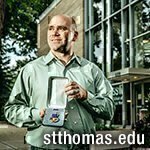 Marcus Kuboy
Marcus Kuboy
University of St. Thomas
St. Paul, MN
Program Type/Area of Study: Master’s degree in Social Work
Years Served: 4
MOS: 68W
Tell us about yourself:
I joined the Army in 2005 and, after six months of training, I attached to the 2-136 CAB out of Bemidji/Detroit Lakes, Minnesota, and spend another six months training with them. I was sent to Iraq in April of 2006 and spent a year there. Toward the end of that year, the truck I was in was hit by a bomb, which broke both my feet and lower legs, my lower back, my left arm and my jaw, and I sustained a TBI. I spent 10 months at Walter Reed and six months at the Minneapolis VA. One of the soldiers hit by the attack later died by suicide, so I decided to try to prevent more of such suicides. I found that social work was a good way to tackle this issue, so I decided that I would pursue degrees in social work.
What prompted you to return to school?
Going to school was one of my goals while I was in Iraq. While I was in the hospital, I reevaluated my goals and kept them. The death of my fellow soldier gave me focus.
Why did you choose University of St. Thomas?
I didn’t want to go to school outside of the Twin Cities. Some of my other choices have more of a macro-focus, and I was far more interested in getting a clinical foundation.
What military education benefits, such as the GI Bill, did you use?
I used Vocational Rehabilitation and Employment benefits. I needed an extension to pursue my graduate degree.
What has your experience been like as a student?
I loved learning and loved the topics, but it was stressful. The faculty was supportive, and my peers were supportive, too. It was very intense, but the instructors are with you the whole time. I wasn’t afraid to bother faculty to ask for help. Having a brain injury, I knew it would be necessary.
What challenges did you have adjusting to campus culture after military life?
Being older than the average student can be a challenge, but my experiences actually lend to my success. After the stress of being in the military, you tend to see stressful situations as just a game. I am better able to compartmentalize things and can zero in on what needs to be done.
Do you believe your military experience has made you a better student?
Yes. I love to learn, but I’m not a “natural student.” I can have a difficult time in a classical classroom setting. However, because of my military background, I tend not to become stressed out in difficult situations, and I’m able to dig a little deeper into my work.
What advice do you have for veterans returning to school?
What worked for me is to use that mission mindset you gain in the military. You set a goal and make decisions to accomplish what you need to do. After the experiences I had, I wanted to live the best possible life I could. I’ve used my military experiences as a springboard in civilian life.
[fusion_button link=”/university-of-st-thomas-success-profile-jules-porter/” color=”default” size=”” stretch=”” type=”” shape=”” target=”_self” title=”” gradient_colors=”|” gradient_hover_colors=”|” accent_color=”” accent_hover_color=”” bevel_color=”” border_width=”1px” icon=”” icon_divider=”yes” icon_position=”left” modal=”” animation_type=”0″ animation_direction=”down” animation_speed=”0.1″ animation_offset=”” alignment=”left” class=”” id=””]Next Profile[/fusion_button]


 Marcus Kuboy
Marcus Kuboy






